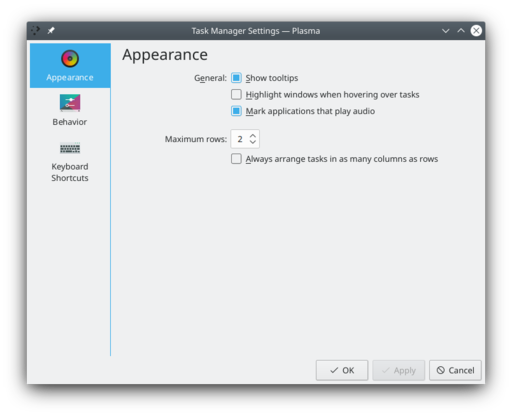Plasma/Tasks/ca: Difference between revisions
(Created page with "=== L'estri Gestor de tasques ===") |
(Created page with "El '''Gestor de tasques''' és en realitat un estri, el que significa que es pot posar a qualsevol lloc. Per exemple, podeu afegir un nou plafó a (diguem) la part superior de la...") |
||
| Line 8: | Line 8: | ||
=== L'estri Gestor de tasques === | === L'estri Gestor de tasques === | ||
El '''Gestor de tasques''' és en realitat un estri, el que significa que es pot posar a qualsevol lloc. Per exemple, podeu afegir un nou plafó a (diguem) la part superior de la pantalla i posar-hi el '''Gestor de tasques''' o podeu posar-lo a l'escriptori. Fins i tot podeu tenir diverses còpies del mateix en diversos llocs. | |||
Whenever you start an application you will see a new tab in the '''Task Manager''' showing the icon of the application and the title of the window that was opened. | Whenever you start an application you will see a new tab in the '''Task Manager''' showing the icon of the application and the title of the window that was opened. | ||
Revision as of 19:01, 11 March 2011
El Gestor de processos de Plasma

El Gestor de tasques proporciona fàcil accés a les aplicacions en execució. Es troba al mig del plafó. Si la finestra d'una aplicació s'ha posat darrere d'altres finestres o si s'ha minimitzat la podeu portar al davant fent clic a la seva pestanya en el Gestor de tasques.
L'estri Gestor de tasques
El Gestor de tasques és en realitat un estri, el que significa que es pot posar a qualsevol lloc. Per exemple, podeu afegir un nou plafó a (diguem) la part superior de la pantalla i posar-hi el Gestor de tasques o podeu posar-lo a l'escriptori. Fins i tot podeu tenir diverses còpies del mateix en diversos llocs.
Whenever you start an application you will see a new tab in the Task Manager showing the icon of the application and the title of the window that was opened.
If you click on the tab corresponding to the active window then that window will be minimized. If there are still windows that have not been minimized then the frontmost of them will become active. If you click on the tab of a minimized window it will be displayed in front of all other windows, and it will become active. If you click on the tab of a window which is displayed behind other windows it will be brought in front of all other windows, and it will become active.
You can also right-click a tab to bring up the context menu. This gives you a number of options. For example, you can set which virtual screens the windows are displayed on, and you can close the window.

If you have many windows opened the tabs may be grouped. In that case you will see a number with a small arrow above in the right hand side of the tab. Clicking on such a tab will bring up a list of tabs for individual windows that you can use just like ordinary Task Manager tabs. Right-clicking a group gives you the option to close all windows in that group.
You can also activate windows by holding Alt down while pressing Tab one or more times. This way you browse through all windows whether displayed or minimized.
Configuration


Something about configuration is needed
